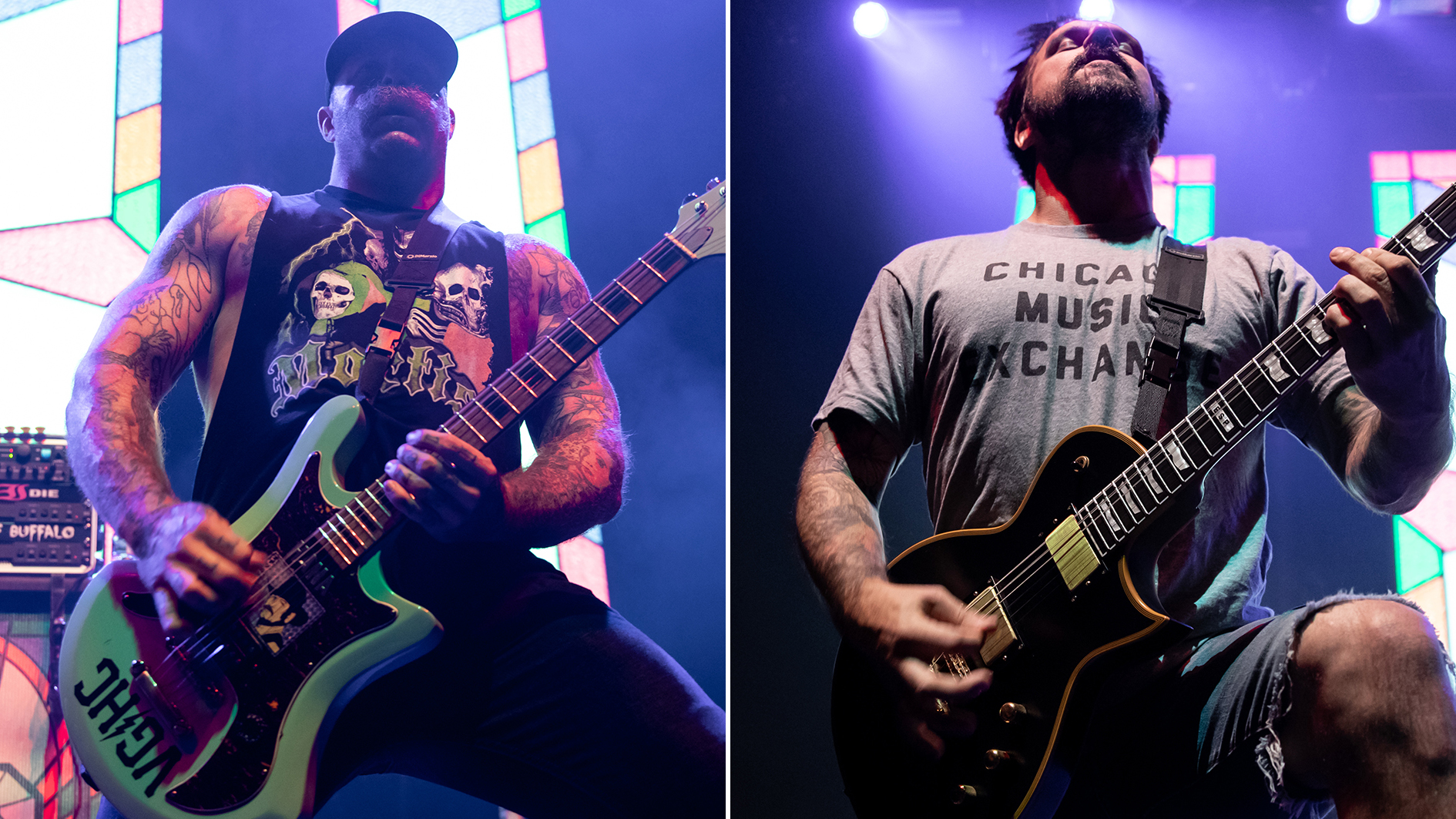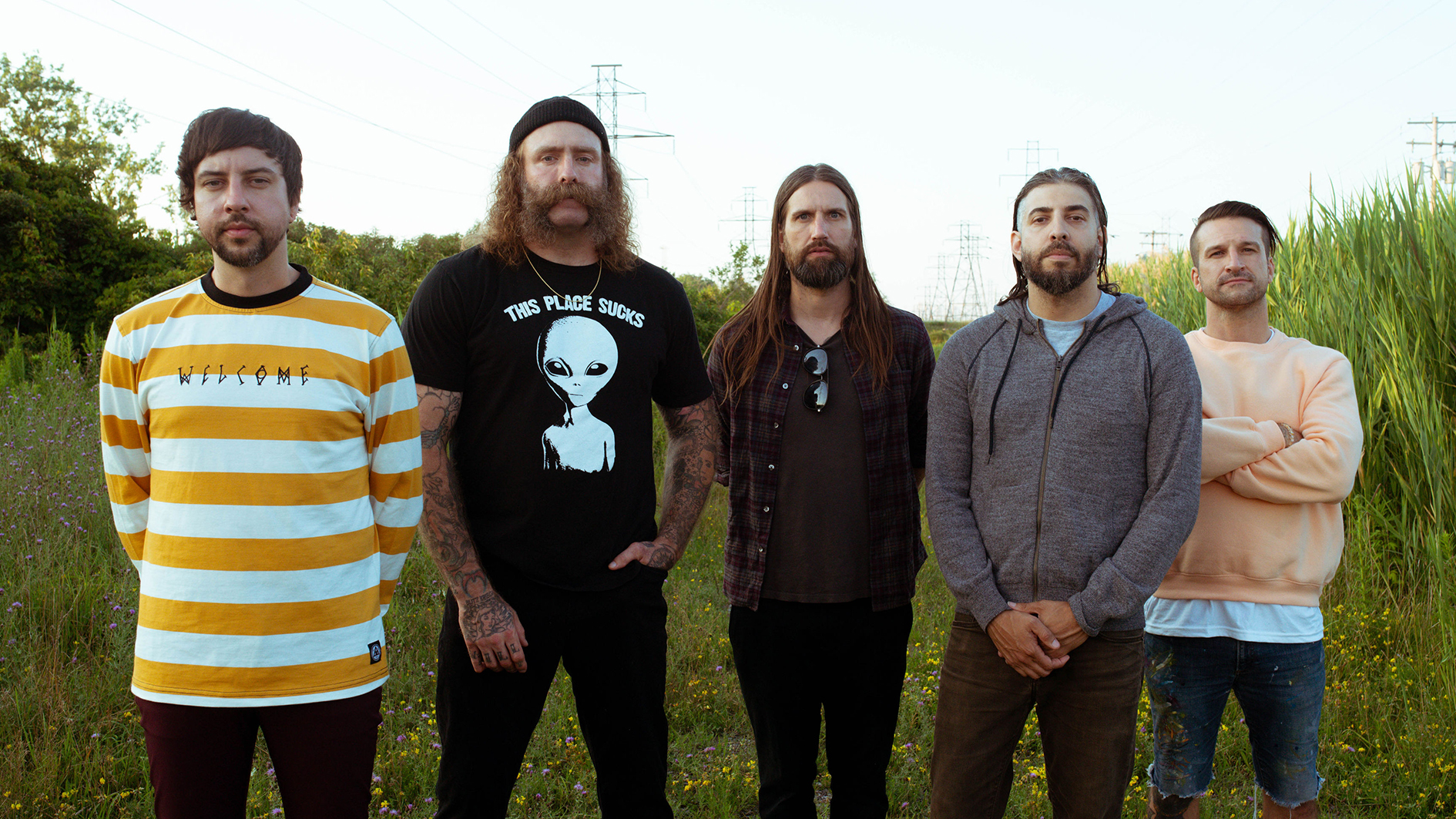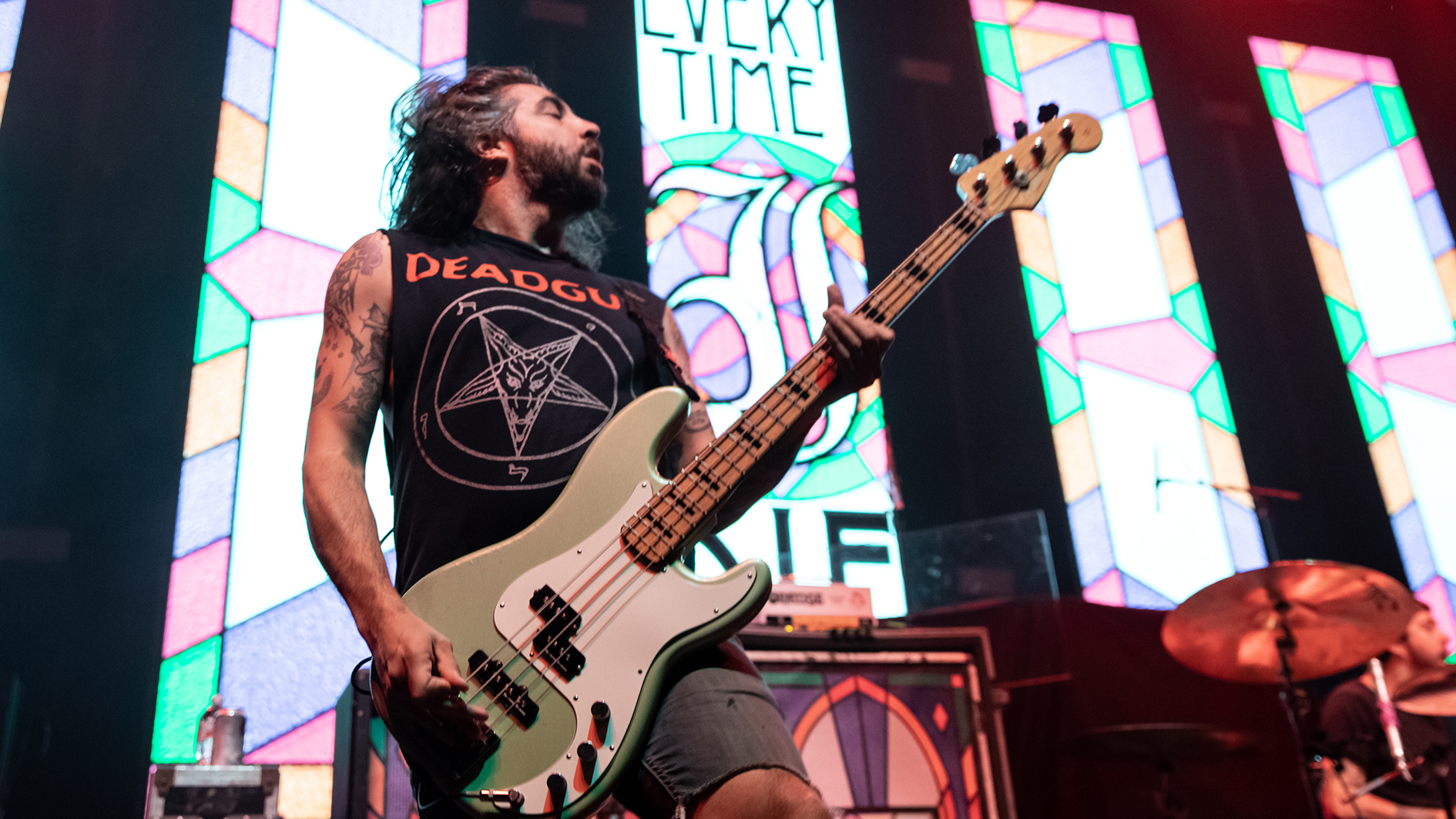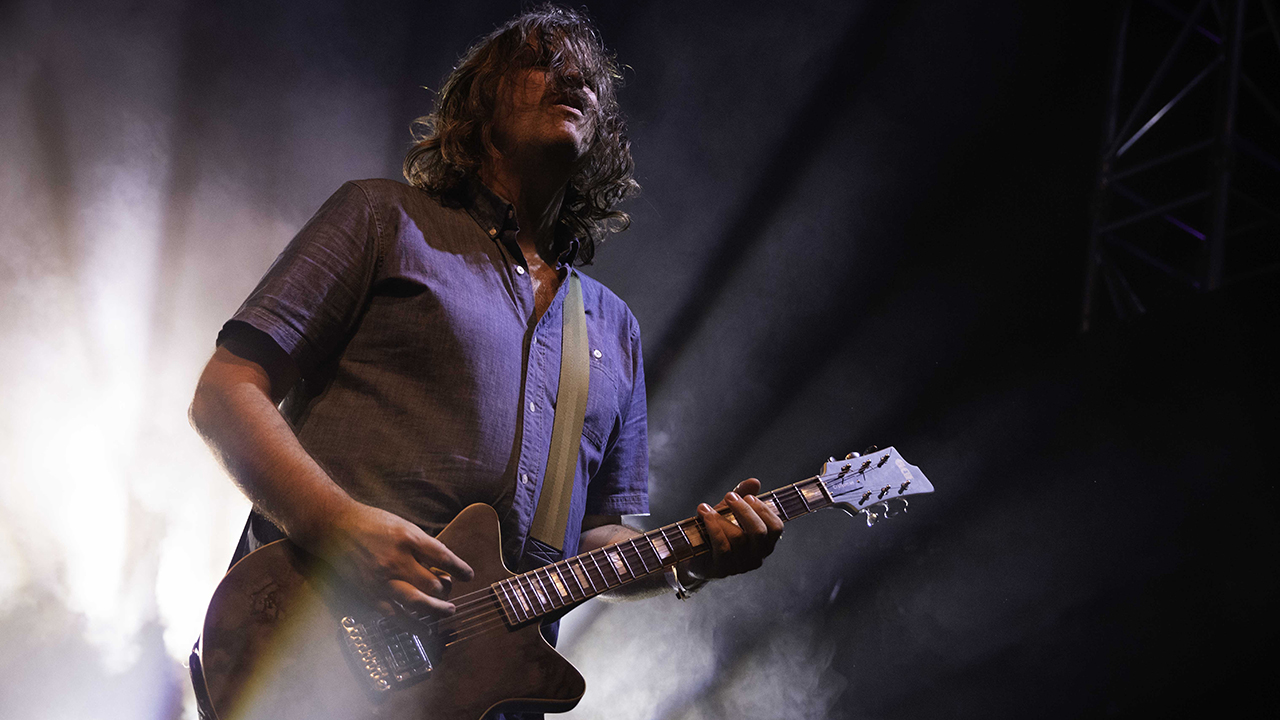Every Time I Die on their tag-team guitar approach, no-holds-barred songwriting philosophy and tweeting fans for gear
Guitarists Andy Williams and Jordan Buckley wax lyrical on their multi-faceted new album, Radical

All the latest guitar news, interviews, lessons, reviews, deals and more, direct to your inbox!
You are now subscribed
Your newsletter sign-up was successful
Every Time I Die guitarist Jordan Buckley knows that his band’s latest full-length, the aptly-titled Radical, is a force to be reckoned with. The multi-faceted, 16-song wrecking ball is rife with savage, yet tech-y breakdowns (Dark Distance), defiantly discordant American D-beat blitzes (Colossal Wreck), and, with the lead lick to latest single Planet Shit, a hickory BBQ sauce-slicked pull-off motif that nevertheless remains more hardcore than Hee-Haw.
While fans in the pit will no doubt go ape over the veteran act’s more familiar, ground-fracking grooves, he and co-guitarist Andy Williams are also excited to see how people will react to Radical’s wildest pivot – the dramatic, yet gently strummed intro to Thing With Feathers.
“Andy and I know kids are going to mosh when we write mosh parts; we already know they’re going to run in a circle when we write fast parts. When you do the weird stuff – and this was my attempt to vibe out – it does make you go ‘Well, fuck man, if kids like this stuff, maybe we should give ‘em more?’”
Buckley adds that he wasn’t exactly sure the clean-channel veneer of the intro riff would fit within the generally bludgeoning world of Every Time I Die, having explained as much in a group message to Williams and bassist Steve Micciche. His co-guitarist, however, was quick to point out, “We’re Every Time I Die: we can do whatever we want.”
When Guitar World connects with Buckley and Williams over Zoom, the latter has just returned to Buffalo following a wrestling match in Orlando the night before – he grapples as The Butcher in AEW alongside tag-team partner Jesse “The Blade” Guilmette.
It’s his second bout back following a springtime thumb injury that kept him out of the ring for months. Having last left listeners with their Low Teens back in 2016, Every Time I Die’s return is no doubt just as anticipated.
Speaking with Guitar World, The Butcher and Buckley got into mini amps, pummeling riffs, and the unlikely Red Hot Chili Peppers nod found on their radical new album.
All the latest guitar news, interviews, lessons, reviews, deals and more, direct to your inbox!
Every Time I Die started playing shows again at the end of the summer, and, Andy, you’ve recently put a few AEW matches under your belt after some time off TV. Obviously you’ve been on the mend, but what had happened to your hand earlier in the year?
Andy Williams: “I tore my UCL, which is basically the thing that holds your thumb up. I tore the ligament -in there, and fractured the bone right where the joint meets; I had to have surgery.
“I never went to physical therapy… but the day after my surgery, with my cast on, I had a guitar in my hand. I was just playing lightly; my hand wouldn’t slide around, but if I stayed in one spot I could do a bunch of different shapes to stay practiced.”
And that was a wrestling injury?
Williams: “Yeah.”
What kind of riffs helped get you back into shape?
Williams: “I was having a bunch of problems with some of the newer songs on the record even before [breaking my thumb]. It’s kind of hard to control the wrestling part of my brain and the guitar part of my brain.
We had been playing Planet Shit and White Void for a while before we recorded them. At this point in time, they’re probably two years old
Andy Williams
“When I have to be creative at the same time with both of those, my memory gets shot. I had just gotten signed by AEW when we were recording the record, and I was wrestling non-stop.”
What riffs on this record are the toughest workouts for you, then?
Williams: “There’s one song Jordan wrote [called Hostile Architecture], and it’s just straight up gymnastics for your fingers. It never stops. I think there’s one time where we’re holding on a note in the entire song. It's riff alphabet soup, but it still kind of makes sense.”
It’s been five years since Every Time I Die released Low Teens, so this has been the longest break between albums for the band. You’d posted about finishing the album early in 2020, so some of this might’ve come down to pandemic delays. That said, how far back do these songs go?
Williams: “We had been playing Planet Shit and White Void for a while before we recorded them. At this point in time, they’re probably two years old.”

Planet Shit in particular runs around this super-slippery, hypnotic lead riff. Is that you or Jordan?
Williams: “Jordan showed up with the majority of the riffs [on that song]. Jordan’s mind is so detail oriented. I’m the exact opposite: I like a groove; I like call backs.
“Jordan’s songs are super-entertaining, you know what I mean? You’re gonna hear a bunch of cool shit. With mine, they’re more of a slow burn, but the ending is cool [laughs]. That’s why Jordan and I are a cool tandem.
“He’s way more meticulous than I am. If you look at his artwork, it’s heavy on detail. I wrestle with a really barebones, smash mouth tag team. That’s my style: just pummeling stuff. It’s really awesome to have two creative tag teams that work completely different.”
Radical opens with Dark Distance, where Keith [Buckley, vocalist] hangs onto this screamed mantra of “spare only the ones I love, slay the rest”. Radical also happens to be the longest Every Time I Die album yet, so did anything get left on the cutting room floor?
Williams: “We put out everything we had. We got to 12 songs [during the writing sessions] and were not slowing down; it was really weird for us. Usually we would be freaking out, like we’d have 10 songs and be like, ‘Oh fuck, we’ve got to write two more.’
That’s just how recordings work: the one that almost gets cut turns out to be your favorite. There was no way around it
Jordan Buckley
“With this one, we’d show up to practice, finish a song, and then the next day Jordan would be like, ‘I’ve got another one,’ and then the next day I’d be like, ‘I’ve got this!’ We just kept going.
Jordan Buckley: “I remember Keith being like, ‘Are there any songs that you guys are leaning towards cutting, just so that I know not to devote time putting lyrics into a song that’s not going to make the cut?’ That’s definitely happened in the past, where there’s one or two that are the runt of the family, but with this one it was like, ‘No, man. Sorry. You have to write lyrics to 16 songs.’
“The last one we wrote ended up being one of my favorites. It ended up being track two [Sly]. I remember Keith being like, ‘I’ve got 15 out of 16 done, so we’ll probably save this one,’ but even Will [Putney, producer] was like, ‘[But] that one’s got a really nice mosh part to it.’ That’s just how recordings work: the one that almost gets cut turns out to be your favorite. There was no way around it. All 16 songs were just so good!”
Jordan, in the Post-Boredom video, you’re playing the role of a vape shop attendant running riffs through a mini Orange on the shop’s counter; Andy, you’re a music store clerk jamming through a Marshall combo. Were those prop-based for the video, or do they actually figure in your collections, and on this record?
Buckley: “I think that Orange is on a recording. The story is boring, but I got it from Hot Topic in 2007 while we were playing on the Take Action Tour. We did a signing at a Hot Topic and they were like, ‘Here, you can have a 50 dollar gift card.’ Hot Topic used to sell these Orange amps for exactly 50 dollars, so I was like ‘all right, let’s do it.’
“It died just before the video shoot, so I had to go to a Guitar Center and get a new one. We just taped it to the old one and made it look like a tiny, two-foot full stack. I know Steve’s got a nice Orange endorsement, so I don’t mind giving them a free plug. I don’t even know what those little minis are called, but they’re awesome!”
There were a couple times where we literally Tweeted out ‘Does anyone have a Fortin 33 pedal?’ and people were showing up with gear for us to use on the record!
Andy Williams
What did they have you playing out of, Andy?
Williams: “I had borrowed a JMP and a Synergy 2x12.”
Did you experiment with your guitar set ups much in the studio?
Buckley: “I always have my set of Eclipses.”
Williams: I like having an arsenal when I go into recordings. I had my Balaguers [his signature Enigma AW Standard]; a couple Les Pauls; that Black Strat I use in the [Post-Boredom] video.
“The thing with that is we have songs that are in drop A, so I’ll have a guitar that sounds great in that tuning; we have songs in C, so then you have to have something for that; and obviously something in Drop D. I’ll want something with a single coil; or something with a PAF; or a normal-ass humbucker, just in case. You never know.
“We’d worked with Will before, too, so we understood his style of recording. We knew he was going to show up with a bunch of shit, and that we were going to show up with a bunch of shit. But there were a couple times where we literally tweeted out, ‘Does anyone have a Fortin 33 pedal?’ and people were showing up with gear for us to use on the record. It was pretty cool!”

You’d spoken on the differences in your respective approaches to guitar, but how about Steve’s playing on the album. You had tweeted about him writing and tracking the guitars on Colossal Wreck, for instance.
Buckley: “He wrote all of Colossal Wreck. Steve’s the backbone. He holds it all together, both literally – that’s the job of rhythm – and figuratively. He’s the first one at practice, and the last to leave. For recording, he’s there on days he doesn’t need to be there.
“Andy and I have just [generally] been the writers. It’s kind of weird to be like ‘Hey, I wrote a song, too,’ but every time he does, it’s fucking amazing. He did a lot of the writing for his old band, Kid Gorgeous, so Steve knows what he’s doing. He also wrote Glitches on the last record; I love that song.
“When we’re lucky enough, he’ll give us some original riffs, and even when it’s not writing riffs, his bass work on this album is unreal. It’s going to cement him as one of the best bass players in the genre.”
Can we get into the new record’s Thing with Feathers? Compared to the rest of Radical’s thrash and metalcore aesthetics, that intro in particular is a nice spot for everyone to take a breath. How does that gentler approach fit into your overall picture of the album?
Williams: “That was all Jordan.”
I specifically remember sending Thing With Feathers to Andy and Steve and being like, ‘Listen to this thing I wrote that would never work for Every Time I Die,’ and Andy wrote back, ‘We’re Every Time I Die, we can do what we want’
Jordan Buckley
Buckley: “I really like how it turned out, almost like [Eagles'] Hotel California meets [Red Hot Chili Peppers'] Under the Bridge.
Williams: “It sounds like if Hot Snakes wrote a ballad, to me.”
Buckley: “I was paying homage to that ’90s emo, tuggin’-on-your-heart shit that I listen to. It was fun putting it together. I specifically remember sending it to Andy and Steve and being like, ‘Listen to this thing I wrote that would never work for Every Time I Die,’ and Andy wrote back, ‘We’re Every Time I Die, we can do what we want.’
“Usually, I take that advice and pertain it to the heaviest, fastest stuff we write, where it’s more like a take-no-prisoners, get-out-of-the-way kind of thing. But what if we applied that to the opposite?
“It’s like a Good Riddance by Green Day thing, where they were so punk that they went the opposite way. I’m kind of being sarcastic, but I remember at the time people were like, ‘What the fuck?’ This band that was known for Dookie, and dick and fart jokes, now they’re doing a much more comparatively beautiful kind of song.
“I thought it would be fun to go the other way like that. We really can do whatever the fuck we want. If it works, it works; if it doesn’t, it doesn’t.”
- Radical arrives October 22 via Epitaph Records.
Gregory Adams is a Vancouver-based arts reporter. From metal legends to emerging pop icons to the best of the basement circuit, he’s interviewed musicians across countless genres for nearly two decades, most recently with Guitar World, Bass Player, Revolver, and more – as well as through his independent newsletter, Gut Feeling. This all still blows his mind. He’s a guitar player, generally bouncing hardcore riffs off his ’52 Tele reissue and a dinged-up SG.

